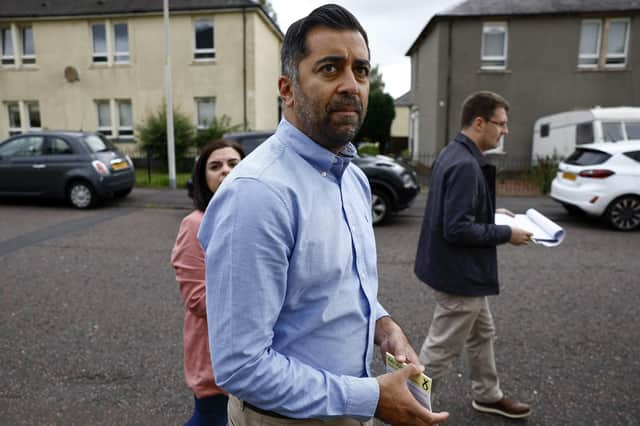Euan McColm: If Humza Yousaf thought 2023 was a tough year, his and his party's woes aren't going away


As 2023 draws to a close, First Minister Humza Yousaf is putting on his bravest face.
Interviewed on Friday, he gave a vaguely convincing performance of “politician in control”, declaring his confidence that the SNP would “come out on top” in the next General Election, which could take place as early as this Spring.
Advertisement
Hide AdAdvertisement
Hide AdHis party might be in the depths of crisis, the independence movement might be fracturing, but Yousaf sticks to the line that everything’s going to work out just fine. He stands, like a cop in front of an exploding firework factory, insisting there’s nothing to see here.
In fact, Yousaf’s time in office has been utterly miserable so far. Celebrations after he succeeded Nicola Sturgeon last March were short-lived. Within weeks of taking office, there were those police raids on SNP headquarters and the Glasgow home Sturgeon shares with her husband, former SNP chief executive Peter Murrell, who was arrested. Soon after, Sturgeon was herself interviewed by police as a suspect in an investigation into allegations of fraudulent use of SNP funds.
Further catastrophes were to add to Yousaf’s woes. Major policies – largely driven by the SNP’s partners in government, the Scottish Greens – were abandoned. There will be no highly protected marine areas (HPMAs). There may, in time, be a deposit return scheme. There will be no further challenge to Scottish Secretary Alister Jack’s decision to block reform of the Gender Recognition Act on the grounds that introducing a policy of self-ID for trans people in Scotland would negatively impact on the UK-wide Equality Act.
Then there was humiliation in his first major electoral test. Yousaf bravely stood front and centre of the SNP campaign team in the Rutherglen and Hamilton West by-election, which was caused by the recall by constituents of former SNP MP Margaret Ferrier after she was convicted of breaking coronavirus lockdown laws, only to watch Labour storm to victory, taking more than half of all votes cast.
The list of First Ministerial woes goes on and on, taking in the defection of fellow leadership contender Ash Regan to Alex Salmond’s Alba Party, the decision of veteran MSP Fergus Ewing not to rejoin the SNP group after a week-long suspension for dissent, the loss of a court battle by the Scottish Government to block details of an investigation into whether Sturgeon broke the minsterial code during her handling of accusations of sexual assault levelled against Alex Salmond, and the subsequent announcement by Salmond – who was cleared in court of a number of charges stemming from those complaints – that he is to sue the Scottish Government. Sprinkled on top of this unpalatable goulash of misery are poll ratings showing Yousaf is far less popular than Sturgeon and that support for the SNP has fallen from around 45 points to 36.
It would be perfectly understandable if the First Minister was relieved to see the back of 2023.
But if Yousaf thought the last year was difficult, I’m afraid he’s got worse to come.
At the 2017 general election, the SNP lost 21 of the 56 MPs it had sent to Westminster two years previously. This result was, in large part, the fault of Nicola Sturgeon who had wrongly believed the 2016 Brexit vote would drive Scots towards the SNP so spent much of her time talking about the inevitability of Scottish independence. Sturgeon misjudged the public appetite for another independence referendum so soon after the 2014 vote.
Advertisement
Hide AdAdvertisement
Hide AdSturgeon was able to weather this defeat for her party because the SNP was absolutely united behind her. Furthermore, across the pro-independence movements, she was seen as an asset.
Yousaf leads a divided party in which almost half of members backed someone else to succeed Sturgeon. He will not be able to brush off serious losses in the coming general election.
And serious losses seem inevitable. The prospect of a Labour government has neutered the long-used SNP line that only it can “protect” Scotland from the Conservatives. Keir Starmer looks likely to defeat the Tories and – if polls are anywhere in the vicinity of the truth – to do so convincingly.
Support for independence may remain north of 45 per cent but many SNP voters have drifted to other pro-independence parties or, fancy that, Labour.
With no prospect of Indyref2 any time soon, some nationalists will gladly back Labour if it means an end to the discredited Tory government at Westminster.
When the SNP, as it will, loses seats in 2024, there will be no shrug from members as there was in 2017. Rather, the sharks already circling Yousaf will draw closer. It is, as those SNP politicians in the know will tell you, entirely possible that a new leader will be in place before the next Holyrood election in 2026. Yousaf simply doesn’t enjoy the level of support needed to easily survive a bruising at the ballot box.
And even if he does, it’s not at all clear how he will heal divisions in the SNP and the broader pro-independence movement. Any number of publicly loyal nationalist politicians will privately admit to grave doubts about Yousaf’s ability to unite his party and inspire a nation.
And then there’s that ongoing police investigation which is expected to conclude, one way or another, during 2024. No matter how things pan out, there will be bitter recrimination. And, I’m afraid, much of the damage is already done. Yousaf was correct, I think, when he said the police probe had contributed to that painful by-election defeat. Many voters have already decided that something stinks.
As Humza Yousaf steps into 2024, he must know that his days as First Minister may soon be over.
Comments
Want to join the conversation? Please or to comment on this article.